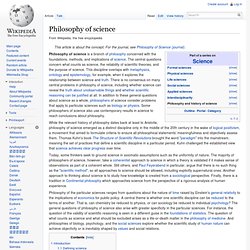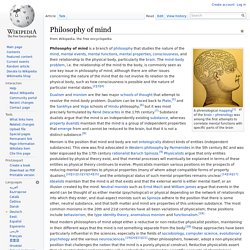

Of Science. Philosophy of science is a branch of philosophy concerned with the foundations, methods, and implications of science.

The central questions concern what counts as science, the reliability of scientific theories, and the purpose of science. This discipline overlaps with metaphysics, ontology and epistemology, for example, when it explores the relationship between science and truth. There is no consensus on many central problems in philosophy of science, including whether science can reveal the truth about unobservable things and whether scientific reasoning can be justified at all. In addition to these general questions about science as a whole, philosophers of science consider problems that apply to particular sciences such as biology or physics. Some philosophers of science also use contemporary results in science to reach conclusions about philosophy. Today, some thinkers seek to ground science in axiomatic assumptions such as the uniformity of nature. Introduction[edit] Of Religion. Of Mind.
A phrenological mapping[1] of the brain – phrenology was among the first attempts to correlate mental functions with specific parts of the brain Philosophy of mind is a branch of philosophy that studies the nature of the mind, mental events, mental functions, mental properties, consciousness, and their relationship to the physical body, particularly the brain.

The mind–body problem, i.e. the relationship of the mind to the body, is commonly seen as one key issue in philosophy of mind, although there are other issues concerning the nature of the mind that do not involve its relation to the physical body, such as how consciousness is possible and the nature of particular mental states.[2][3][4] Mind–body problem[edit] Our perceptual experiences depend on stimuli that arrive at our various sensory organs from the external world, and these stimuli cause changes in our mental states, ultimately causing us to feel a sensation, which may be pleasant or unpleasant.
Arguments for dualism[edit] Of Law. Philosophers of law ask "what is law?

" and "what should it be? " Of Language. Of Beauty. "Aesthetician" redirects here.

For a cosmetologist who specializes in the study of skin care, see Esthetician. More specific aesthetic theory, often with practical implications, relating to a particular branch of the arts is divided into areas of aesthetics such as art theory, literary theory, film theory and music theory. An example from art theory is aesthetic theory as a set of principles underlying the work of a particular artist or artistic movement: such as the Cubist aesthetic.[6] Etymology[edit] The word aesthetic is derived from the Greek αἰσθητικός (aisthetikos, meaning "esthetic, sensitive, sentient"), which in turn was derived from αἰσθάνομαι (aisthanomai, meaning "I perceive, feel, sense").[7] The term "aesthetics" was appropriated and coined with new meaning in the German form Æsthetik (modern spelling Ästhetik) by Alexander Baumgarten in 1735.
Of Politics. Of Ethics. The three major areas of study within ethics are:[1] Meta-ethics, concerning the theoretical meaning and reference of moral propositions, and how their truth values (if any) can be determinedNormative ethics, concerning the practical means of determining a moral course of actionApplied ethics, concerning what a person is obligated (or permitted) to do in a specific situation or a particular domain of action[1] Defining ethics[edit] The word "ethics" in English refers to several things.[6] It can refer to philosophical ethics—a project that attempts to use reason in order to answer various kinds of ethical questions.

[citation needed] It can also be used to describe a particular person's own, idiosyncratic principles or habits.[7] For example: "Joe has good ethics. " [edit] Main article: Meta-ethics Meta-ethics has always accompanied philosophical ethics. The ontology of ethics is about value-bearing things or properties, i.e. the kind of things or stuff referred to by ethical propositions. Of Metaphysics. Metaphysics is a traditional branch of philosophy concerned with explaining the fundamental nature of being and the world that encompasses it,[1] although the term is not easily defined.[2] Traditionally, metaphysics attempts to answer two basic questions in the broadest possible terms:[3] Ultimately, what is there?

What is it like? Prior to the modern history of science, scientific questions were addressed as a part of metaphysics known as natural philosophy. Originally, the term "science" (Latin scientia) simply meant "knowledge". Of Logic. Logic (from the Ancient Greek: λογική, logike)[1] is the branch of philosophy concerned with the use and study of valid reasoning.[2][3] The study of logic also features prominently in mathematics and computer science.

Logic is often divided into three parts: inductive reasoning, abductive reasoning, and deductive reasoning. The study of logic[edit] The concept of logical form is central to logic, it being held that the validity of an argument is determined by its logical form, not by its content. Traditional Aristotelian syllogistic logic and modern symbolic logic are examples of formal logics. Informal logic is the study of natural language arguments.
Logical form[edit] Main article: Logical form. Of Knowledge. A branch of philosophy concerned with the nature and scope of knowledge Epistemology (; from Greek ἐπιστήμη, epistēmē, meaning 'knowledge', and -logy) is the branch of philosophy concerned with the theory of knowledge.

Epistemology is the study of the nature of knowledge, justification, and the rationality of belief. Much debate in epistemology centers on four areas: (1) the philosophical analysis of the nature of knowledge and how it relates to such concepts as truth, belief, and justification,[1][2] (2) various problems of skepticism, (3) the sources and scope of knowledge and justified belief, and (4) the criteria for knowledge and justification. Epistemology addresses such questions as: "What makes justified beliefs justified? ",[3] "What does it mean to say that we know something? " Etymology[edit]